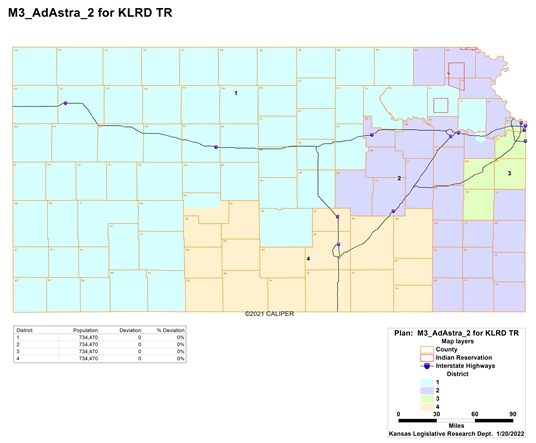The Kansas Supreme Court will consider if district court judge correctly followed the state constitution when ruling the Republican-led Kansas Legislature drew a racially and politically gerrymandered congressional map.
by Dylan Lysen, KCUR and Kansas News Service
Connie Brown Collins felt ecstatic when a Wyandotte County judge recently struck down a congressional redistricting map drawn by the Republican-led Kansas Legislature.
The Kansas City, Kansas, resident said she and others repeatedly told lawmakers that the map unfairly split racially diverse Wyandotte County into two separate congressional districts. They argued the districts were drawn to drown out their votes to help Republican candidates win elections in all four of the state’s congressional districts.
Additionally, residents in Lawrence made a similar argument about shifting the Democratic stronghold into the deep-red 1st District that represents western Kansas.
It took a first-of-its-kind ruling from District Court Judge Bill Klapper to, for now, strike down the map.
“Now that the ruling has been handed down,” said Brown Collins, a plaintiff in the case, “I’m just very, very happy.”
Now the state has appealed Klapper’s ruling to the Kansas Supreme Court.
The state’s highest court is scheduled to take up the case in May. That sets the stage for the justices to issue a landmark ruling on how far one political party in Kansas can gerrymander congressional districts.
But the justices will need to act quickly to meet a looming June 1 deadline, which is the registration deadline for candidates to file for election. That will stretch to June 10 if a map is not finalized by May 10.
On Friday, the court announced it scheduled the case to be heard on May 16, all but ensuring the registration deadline will be extended. Here’s what could happen next:
Kansas Supreme Court hears appeal
The court will first hear oral arguments from attorneys in the case. The defendants in the case, who are representing the state and appealing the ruling, will need to argue Klapper misapplied state law.
Meanwhile, attorneys representing the plaintiffs in the case will argue that Klapper’s ruling is correct.
Unlike the trial in Wyandotte County, the court will not hear any new testimony or evidence. The justices will simply decide whether Klapper properly followed the Kansas Constitution.
Justices look at two separate issues in ruling
The court will face two specific issues: whether the state law protects Kansans from both political and racial gerrymandering.
Washburn University law professor Christopher Gunn, an elections expert, said the court only needs to uphold Klapper’s decision on one of those issues. He believes Klapper’s ruling on the racial gerrymander issue is much easier to sort out because state law is more strict in protecting Kansans from race discrimination.
But Gunn wants the court to consider both and issue a ruling that will set the standard for what constitutes racial and political gerrymandering for years to come.
“I’m hoping the justices on our supreme court take the time to look through these issues and identify for us what this is so that, at least for Kansans, this issue is largely put to rest,” Gunn said.
Supreme Court orders vary based on ruling
If the court chooses to uphold Klapper’s ruling, it will have a few options on how to handle the issue going forward.
First, it would likely order the Kansas Legislature to redraw the map with stipulations that it doesn’t again create racially and politically gerrymandered districts.
But because the deadline for candidates is close at hand, the court may order the 2020 maps to stay in effect for the 2022 midterm elections, Gunn said.
Alternatively, the justices could order the district court, specifically Klapper, to draw new districts to be put into place before the deadline. Gunn said that is less likely, but not unheard of. He noted the 2020 congressional district map was drawn by a federal court judge in 2012.
There is also the chance the map that was struck down is resurrected. The justices could disagree with Klapper and rule that he misapplied the state law. If that occurs, the congressional map drawn by the Republican-dominated Legislature would be reinstated to exist for the next 10 years.
Brown Collins said she hopes the court upholds Klapper’s ruling and lawmakers take her concerns into account when redrawing the districts.
“If they send the map back to be redrawn by the Legislature, I just hope that they heed what the community has told them over and over and over,” she said.
Dylan Lysen reports on politics for the Kansas News Service. You can follow him on Twitter @DylanLysen or email him at dlysen (at) kcur (dot) org.
The Kansas News Service is a collaboration of KCUR, Kansas Public Radio, KMUW and High Plains Public Radio focused on health, the social determinants of health and their connection to public policy.
Kansas News Service stories and photos may be republished by news media at no cost with proper attribution and a link to ksnewsservice.org.
See more at https://www.kcur.org/news/2022-04-29/the-kansas-supreme-court-to-say-if-republicans-gerrymandered-the-states-congressional-map

